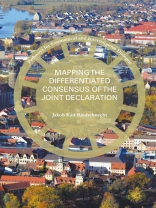This book uses the insights of cognitive linguistics to argue for the possibility of differentiated consensus between separated churches. The Joint Declaration on the Doctrine of Justification, signed by the Lutheran World Federation and the Roman Catholic Church in 1999, represents the high water mark of the twentieth-century ecumenical movement. It declares that the sixteenth-century condemnations related to justification do not condemn the teachings of the partner church. Some critics reject the agreement, arguing that a consensus that is differentiated is not actually a consensus.
In this book, Jakob Karl Rinderknecht shows that mapping the ‘cognitive blends’ that structure meaning can reveal underlying agreement within apparent theological contradictions. He traces Lutheran and Catholic positions on sin in the baptized, especially the Lutheran
simul iustus et peccator and the Catholic insistence that concupiscence in the baptized is not sin. He demonstrates that the JDDJ reconciles these positions, and therefore that a truly differentiated consensus is possible.
Tabela de Conteúdo
Introduction. The Problem Of Ecclesial Disunion.- Part I. The Joint Declaration: History & Critiques.- 1. Justification And Anthropology In The Jddj.- 2. The Problem Of Differentiated Consensus.- Part II. Consensus And Conceptual Mapping.- 3. What Is Ecumenical Consensus?.- 4. Consensus Despite Difference.- 5. Cognitive Linguistics And Consensus.- 6. Cognitive Linguistics And Theology.- Part III. Mapping The Differentiated Consensus In The Jddj.- 7. Mapping The Catholic Blend: Trent & Concupiscence.- 8. The Catholic Blend Sin And The Jddj.- 9. Mapping The Lutheran Blend: Simul Iustus Et Peccator.- 10. The Lutheran Blend Sin And The Jddj.- Conclusion. Differentiated Consensus In The Jddj.
Sobre o autor
Jakob Karl Rinderknecht is Director of the Pastoral Institute and an Assistant Professor of Religious Studies at the University of the Incarnate Word, USA. He is also a Postdoctoral Fellow of the Louisville Institute, USA. His research on ecumenical questions has appeared in
Horizons and
The American Benedictine Review.












